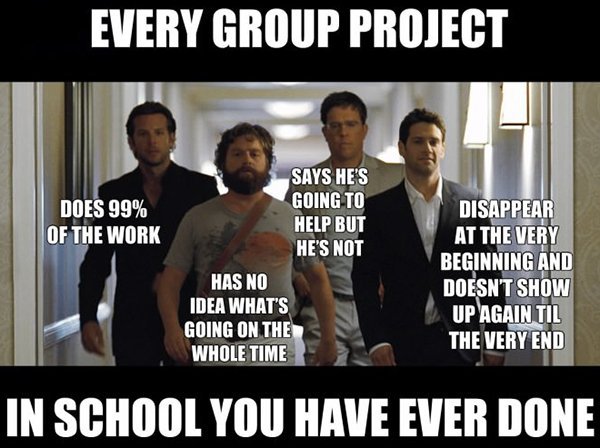I know you. You don’t play well with others. You’re the Tony Stark of the metaphorical Avengers that is your group project. Go ahead. Say it, “I am Iron Man.” You know you want to.
And that’s okay sometimes, but eventually, you’re going to need to work with others to create something that you couldn’t by yourself. (Or because your teacher says you have to.)
Collaboration is scary and frustrating for most, but fear not, true believer. Here’s how to avoid going all “Hulk smash!” during your next group project.

1) Keep Calm
Our brains still think we live in cave people times. Back then, when you felt stress, it was usually because a sabre-tooth tiger was trying to eat you.
Pitching our ideas to people is stressful. So those sweaty palms, that elevated heart rate, and forgetting what you were saying are all completely natural results. Your brain is basically gearing up your body to deal with a sabre-tooth tiger.
Tip for keeping calm? Don’t try to memorize your pitch. Know your key points, and fill in the rest naturally.
Not only does a rehearsed pitch sound artificial and lacking in passion, but the second you forget one point, you’re going to scramble, panic and freeze. Never a pretty sight. Your iBrain closes the Pitch app and opens up the ‘don’t let a sabre-tooth tiger kill you’ app.
Pitch sessions are usually a casual thing and the people you’re pitching to just want to have a conversation about your idea. Keep it casual and stay cool…even if they’re the no-video, no-microphone type on your video call.
2) Keep the Creative Energy Flowing
The worst thing you can do in a group meeting is kill the flow of creative energy. The quickest way to do that? Mercilessly shooting down somebody else’s idea. (And staying muted, while a little more polite, is almost as bad.)
Not only does nobody want to work with somebody who hates on every idea, but shooting down an idea is just going to make everyone keep scratching their heads. Or worse, make them reluctant to pitch.
Collaboration truly needs to be an open forum where no idea is treated as stupid. Ideally, you want to discuss, examine, and build upon as many ideas as you can. If something doesn’t quite work, politely and calmly move on.
Tip if you find the room is stalling on ideas, pitch something ridiculous, just for laughs. You’d be surprised how quickly riffing on a joke gets the creative energy flowing again.
3) Have Thick Skin
Being criticized for your work can hurt.
Somehow, we have this notion that if our idea sucks, we suck. As if an attack on our idea is an attack on our very being.
Well, it’s not true. What is true is that for every excellent idea you have, you’ll probably have 15 to 20 not-so-good ones.
Dust your shoulders off and get back in there. Your next idea could be gold.
4) Give Active Feedback
Be generous with your compliments when you legitimately like somebody’s idea. It takes very little to encourage somebody, and not only can you help empower people to get over their own pitch anxiety, but it helps keep the creative flow going.
High energy usually means high productivity.
Tip if you want to counter or criticize somebody’s point or pitch, try the compliment sandwich.
Compliment somebody on what you legitimately liked about their pitch (maybe a point you agreed with), voice your concern or opinion, and then reiterate your compliment or another compliment.
5) You Don’t Have to Be the Smartest Person in the (Virtual) Room
If somebody starts questioning your idea or pitch, there is nothing wrong with answering, “I’m not sure.” And as much as you might fear saying that last sentence, watch what happens when you follow it up with, “what do you guys think?”
You bet your sweet ass it’ll keep that creative energy flowing.
Not only will you not always have all the answers, but it’s also important to remember that all your ideas are not naturally superior to everybody else’s.
That’s the point of collaboration. Where you are weak, your peers can be strong and together, you work towards building something that you couldn’t individually.
It’s not about you, it’s not even about the group. It’s about what you create together.
Read More: What Should I Do If My Group Members Suck?

More top resources just for students
*Opinions expressed are those of the author, and not necessarily those of Student Life Network or their partners.




